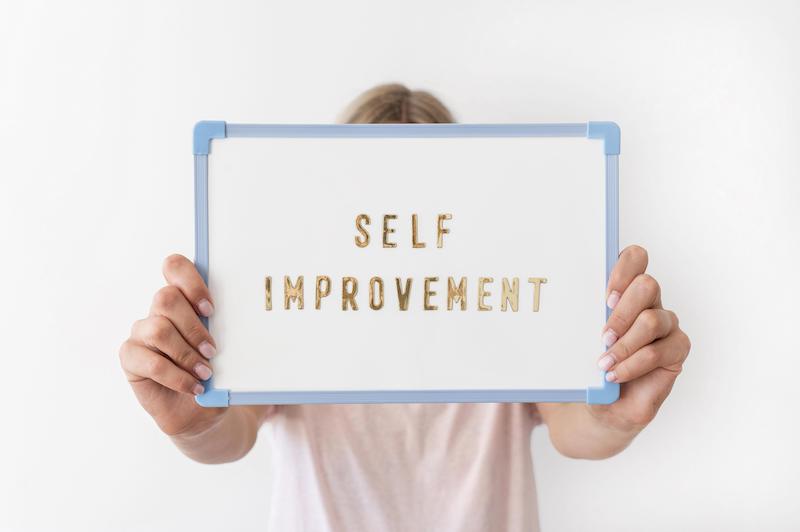Introduction
Welcome to the world of self-improvement, where you embark on a transformative journey to unlock your best self. This article will explore the art of self-improvement, providing valuable insights and practical tips to help you grow, evolve, and unleash your full potential. Self-improvement is not just about achieving external success; it’s about nurturing your inner being, cultivating positive habits, and embracing personal growth. Are you ready to embark on this exciting quest? Let’s dive in!

The Power of Self-Reflection
Self-reflection serves as a powerful tool in the art of self-improvement. By reflecting on your thoughts, actions, and emotions, you gain deeper insights into yourself. Start by asking yourself thought-provoking questions such as, “What are my strengths and weaknesses?” or “What aspects of my life do I want to improve?” Through introspection, you can identify areas for growth and devise strategies to enhance those aspects of your life.
Setting Meaningful Goals
Setting meaningful goals is an integral part of the self-improvement process. Goals provide us with direction, motivation, and a sense of purpose. When setting goals, ensure they are specific, measurable, attainable, relevant, and time-bound (SMART). For example, instead of developing a vague goal like “improve my fitness,” set a SMART goal like “run a 10K race within six months.” This way, you have a clear target and can track your progress effectively.
Developing Positive Habits
Habits shape our lives, so it’s crucial to cultivate positive habits that align with your vision of your best self. Start by identifying habits holding you back and replacing them with empowering ones. For instance, if you procrastinate, replace it with a habit of taking immediate action. Remember, it takes time and consistency to develop new habits, so be patient and persistent in your efforts.
Embracing Continuous Learning
Learning is a lifelong journey, and embracing continuous learning is essential for self-improvement. Expand your knowledge and skills by reading various books, attending workshops, or taking online courses. Seek out mentors who can guide you on your path to personal growth. Surround yourself with individuals who inspire and challenge you to become the best version of yourself. Remember, growth happens outside of your comfort zone.
Cultivating Self-Compassion
Self-improvement is not about striving for perfection; it’s about embracing self-compassion and accepting yourself as a work in progress. Be kind and gentle with yourself, especially during setbacks or failures. Treat yourself with the same love and understanding you would offer a dear friend. Remember, self-compassion allows for growth and fosters a healthy mindset.
Practicing Mindfulness
Mindfulness is a powerful practice that can significantly contribute to your self-improvement journey. By being fully present at the moment, you cultivate awareness and deepen your connection with yourself. Practice mindfulness through meditation, breathing exercises, or simply by engaging in activities with full attention. As you become more mindful, you’ll better understand your thoughts, emotions, and behaviors, allowing you to make conscious choices that align with your best self.
Nurturing Healthy Relationships
The relationships we cultivate are significant in our personal growth and self-improvement. Surround yourself with individuals who uplift and support you on your journey. Seek out friendships and partnerships built on trust, mutual respect, and shared values. Engage in meaningful conversations and learn from others’ experiences. Remember, healthy relationships provide a nurturing environment for personal growth.
Overcoming Limiting Beliefs
Limiting beliefs can hinder your progress in the art of self-improvement. These negative thoughts and beliefs hold you back from reaching your full potential. Identify and challenge your limiting beliefs by examining the evidence supporting or refuting them. Replace these beliefs with positive affirmations and empowering thoughts. Remember, you have the power to rewrite your narrative and overcome any obstacles that come your way.
Balancing Self-Care and Productivity
In pursuing self-improvement, it’s essential to balance self-care and productivity. While it’s important to work towards your goals and aspirations, taking care of your physical, mental, and emotional well-being is equally important. Make time for activities that rejuvenate you, such as practicing self-care rituals, spending time in nature, or engaging in activities that bring you joy. Remember, self-care is not selfish; it’s an act of self-love and nourishment.
Building Emotional Intelligence
Emotional intelligence is a key aspect of self-improvement. It involves recognizing and managing your emotions effectively, as well as understanding and empathizing with the emotions of others. By developing emotional intelligence, you can enhance relationships, communicate more effectively, and make better decisions. Practice self-awareness, self-regulation, empathy, and social skills to strengthen emotional intelligence.
Harnessing the Power of Visualization
Visualization is a powerful technique that can aid in self-improvement. By vividly imagining yourself achieving your goals and living your best life, you create a blueprint aligning your subconscious mind with your desires. Regularly visualize your success, envision the steps you need to take, and embrace the emotions of accomplishment. This practice can enhance motivation, boost confidence, and increase your chances of realizing your dreams.
The Role of Gratitude in Self-Improvement
Gratitude is a transformative practice that can elevate your self-improvement journey. By cultivating a mindset of gratitude, you shift your focus from what’s lacking to what you already have. Take time each day to reflect on your gratitude and express your appreciation to others. Gratitude fosters positivity, resilience, and a sense of abundance, propelling you on your path of self-improvement.
Mastering Time Management
Effective time management is crucial for self-improvement. By organizing your time wisely and prioritizing tasks, you can make the most of each day and maximize your productivity. Identify your most important goals and allocate dedicated time for them. Use productivity techniques like the Pomodoro Technique or time-blocking to stay focused and minimize distractions. Time is a precious resource, and managing it effectively can accelerate your self-improvement journey.
The Importance of Self-Reflection in Decision Making
Self-reflection plays a vital role in decision-making processes. You can make decisions that align with your best self by pausing to reflect on your values, desires, and long-term goals. Before making important choices:
- Take the time to analyze the potential outcomes.
- Consider the impact on your personal growth.
- Evaluate whether it aligns with your values and aspirations.
Self-reflection provides clarity and empowers you to make decisions that contribute to your well-being and growth.
Fostering Resilience in the Face of Challenges
Challenges and setbacks are inevitable in life, but resilience allows you to bounce back and continue on your self-improvement journey. Cultivate resilience by reframing challenges as opportunities for growth, practicing positive self-talk, and seeking support from others. Embrace a growth mindset that sees failures as learning experiences and setbacks as stepping stones toward success. With resilience, you can overcome obstacles and emerge stronger and wiser.
Surrounding Yourself with Inspiration
Surrounding yourself with sources of inspiration can fuel your self-improvement efforts. Seek books, podcasts, or TED Talks that align with your interests and goals. Connect with communities or online forums centered around personal development. Engage in discussions and learn from individuals who have achieved what you aspire to. Remember, the company you keep and the information you consume profoundly impact your mindset and motivation.
The Power of Affirmations
Affirmations are positive statements that can reprogram your subconscious mind and reinforce empowering beliefs. Create a list of affirmations that align with your self-improvement goals and repeat them daily. Visualize the desired outcomes as you recite the affirmations, allowing the positive statements to penetrate your subconscious mind. Affirmations can boost confidence, overcome self-doubt, and cultivate a successful mindset.
Maintaining a Growth Mindset
A growth mindset is crucial for continuous self-improvement. Embrace the belief that your abilities and intelligence can be developed through dedication, effort, and a willingness to learn. Embrace challenges as opportunities for growth, view failures as stepping stones to success, and seek feedback to improve. With a growth mindset, you open yourself up to limitless possibilities and embrace the journey of self-improvement with enthusiasm and resilience.
FAQs (Frequently Asked Questions)
Q: How long does it take to see results in self-improvement?
A: The time it takes to see results in self-improvement varies from person to person. It depends on several factors, including the specific goals you have set, the commitment and effort you put in, and the nature of the changes you seek. Generally, it’s important to remember that self-improvement is a lifelong journey, and significant transformations often occur over an extended period of consistent effort.
Q: Can self-improvement help with overcoming fears and insecurities?
A: Absolutely! Self-improvement provides an excellent framework for overcoming fears and insecurities. By focusing on personal growth, building self-confidence, and developing resilience, you can gradually confront and conquer your fears. Engaging in self-reflection, seeking support from mentors or therapists, and taking small steps outside of your comfort zone can all contribute to overcoming fears and insecurities.
Q: How can self-improvement benefit my professional life?
A: Self-improvement has numerous benefits for your professional life. By enhancing your skills, expanding your knowledge, and cultivating positive habits, you become a more valuable asset in the workplace. Self-improvement also fosters qualities such as adaptability, resilience, and effective communication, which are highly sought after by employers. Additionally, by setting and achieving meaningful goals, you can advance your career and open up new opportunities for growth and success.
Q: What role does self-reflection play in self-improvement?
A: Self-reflection plays a crucial role in self-improvement. It allows you to understand yourself better, identify growth areas, and make conscious choices that align with your values and aspirations. Through self-reflection, you can uncover limiting beliefs, explore your strengths and weaknesses, and develop strategies for personal growth. It serves as a powerful tool for self-awareness and self-discovery.
Q: Can self-improvement help in building better relationships?
A: Yes, self-improvement can significantly contribute to building better relationships. When you work on yourself, cultivating qualities such as empathy, effective communication, and emotional intelligence, you enhance your ability to connect with others on a deeper level. By nurturing your well-being, you become more available to support and uplift those around you. Self-improvement also allows you to identify and address patterns or behaviors that may hinder your relationships, fostering healthier and more fulfilling connections.
Q: Is self-improvement a continuous process?
A: Yes, self-improvement is a continuous process. It’s essential to recognize that personal growth is not a destination but a lifelong journey. As you achieve your goals and unlock new aspects of your best self, new opportunities for improvement will arise. Embracing self-improvement as an ongoing practice allows you to adapt, evolve, and strive to become the best version of yourself.
Conclusion
The art of self-improvement is a transformative journey that empowers you to unlock your best self. By incorporating self-reflection, goal-setting, positive habits, continuous learning, self-compassion, and mindfulness into your life, you can embark on a path of personal growth and fulfillment. Nurturing healthy relationships, overcoming limiting beliefs, and balancing self-care with productivity are essential aspects of this journey. Embrace the power of visualization, gratitude, and emotional intelligence as you strive to become the best version of yourself. Remember, self-improvement is a continuous process that unfolds throughout your life, allowing you to adapt, evolve, and unlock your full potential.
